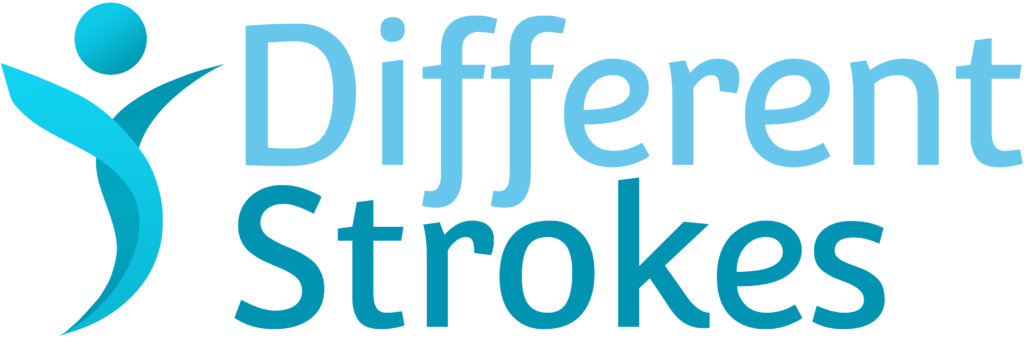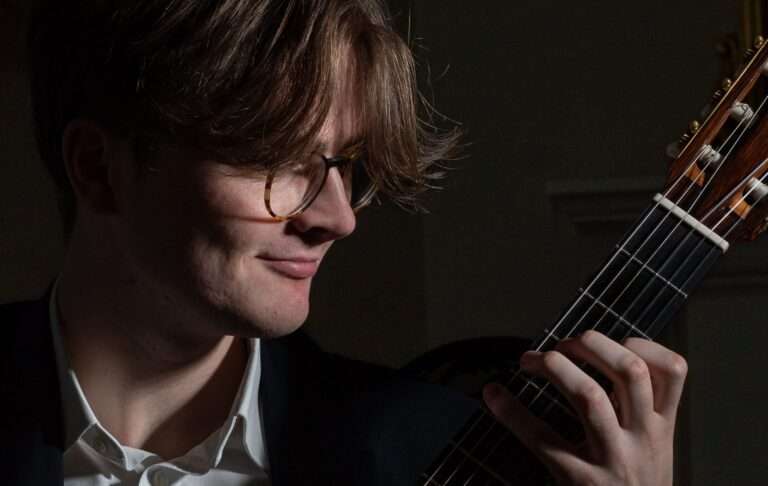Tom’s Story – First of three strokes at just 9 years old
- Greg Hollingworth

My name’s Tom and I’m a stroke survivor, and although I am from Brentwood, Essex, when I was 18 I moved to Graz, Austria to study Classical Guitar. One morning when I was 9, before leaving for school, I had a bizarre episode. Out of the blue, my eyes went uncontrollably cross-eyed for about five seconds and then returned to normal. It left me with a strong headache for about a minute, which then went away.
This was the first time it had happened, and understandably, when I told the adult looking after me what had just happened, they thought I was just fibbing (which, at the time, I was certainly prone to doing). I continued my day as normal until walking to the school assembly that morning when I suddenly started feeling very dizzy and unstable. I was very ataxic. Not knowing what was going on and being in a whole-school assembly, I didn’t want to make a fuss, so I did nothing. This ataxia continued for the next few days, alongside episodes of nausea.

Later, we realized that these episodes I had were TIAs. A couple of days later, while playing in a paddling pool at home, I suddenly got a terrible headache, like nothing I’ve had before or since. It passed after about thirty minutes. I was in my bedroom when, all of a sudden, my eyes went uncontrollably in different directions, like they were being ripped apart. Unlike the other day when this happened, they stayed like this for about an hour, and I was left with double vision for several weeks after. I lost all my balance and fine motor skills instantly and cried out to my mum, who then sent me to the hospital. At first, they were unsure what had happened, but then they found I had had an ischaemic stroke in my right thalamus. After two weeks in the hospital, thankfully, my symptoms passed (except for my double vision, which remained a little longer). At the time, no cause could be found, and all the doctors at Great Ormond Street, where I was being treated, were completely stumped.
In the interim period between this and the next stroke in 2020, I made a full recovery and returned to doing all of my sports and activities. However, I had never really been able to process emotionally what had happened to me due to my young age, leaving me with PTSD from the event of the stroke and anxiety that has remained with me to this day. Before the next stroke, I suffered various possible TIAs, but still no cause was found despite ongoing tests.
Soon after the first stroke, I began to play the guitar, which quickly developed into a passionate hobby. It would help calm me when I was distressed and always felt like a real “f*ck you” declaration to the stroke, being able to do these intricate things with my fingers after briefly losing that ability.
Fast forward six years, and after going for a routine MRI scan of my brain, we discovered that I’d had another smaller stroke, that I hadn’t even realised. We think this happened when I had one of these suspected TIAs. This was a real shock to my family and me, as we had been told fairly assuredly that the risk of me having another stroke was extremely low. It felt like a real setback, as at this point, my life was going very well. My guitar playing was progressing strongly, and I was doing well in secondary school. From this point on, the investigations were ramped up, but still nothing was found. I went a relatively long time without any TIA-like episodes, which by then we had been told were most likely a form of migraine.
After completing my A-levels, I moved to Austria to study under a world-renowned guitar professor to develop my music further. Before moving, I was discharged from the hospital with doctors saying that I should move on with my life and try to put all this in the past. However, with no cause ever found, something still didn’t feel right deep down. After nine months of living in Austria (having a great time), one morning in the main train station, before leaving for a day trip with a friend, the exact same thing happened – like it did ten years prior. My eyes went in opposite directions in incredible pain and stayed like that; then my entire right side gave in, and I collapsed onto the floor. I was rushed to the hospital, hardly able to open my eyes because of the pain in them. After arriving, a horrible flush of pins and needles rushed through my entire right side, and I lost control of the whole side. This whole experience was truly terrifying. I was in a foreign country, with people speaking a foreign language all around me, disoriented, in shock, and in a lot of pain, both physically and emotionally.
After a scan, the doctors came and explained to me that I had just had my third stroke. After a week in the hospital in Graz, I made a pretty much full recovery; however, I was beyond tired. A few days before my parents had flown out from the UK to come and help me get home, so the day after leaving the hospital, we got back on the first flight to Stansted to begin investigating what had happened on the NHS. Just after landing, I noticed a strange numbness in my right leg. We put it down to exhaustion and went straight back home from the airport. About fifteen minutes after getting home, I collapsed walking up a flight of stairs and had a TIA with my right side going numb. I was sent to the hospital and given a thrombotic injection after having probably around 7-10 TIAs that evening. I was discharged a week later and stayed at home for four months until I could return to Austria – alone.
After leaving the hospital in the UK, I was referred to a team at the Imperial College Healthcare Trust. After some tests, the doctors found a PFO (patent foramen ovale) in my heart, which is likely to be the cause of my strokes. I am currently awaiting closure surgery.
Recovering from the (first, and two main) strokes that I have had has been without a doubt the biggest challenges of my life.
It has taken me years to fully appreciate the enormity of what happened to me when I was 9 and how it has affected my character both positively and negatively.
My music has always been a real life line for me; it’s been and will continue to be a way for me to convey the negative things I have been through in a positive way. Being able to reframe these bad experiences and be appreciative of what they have brought me has massively helped to accept everything and come to peace with things. Without the strokes I probably would not play the guitar, and that is a terrifying thought; so in a way I’m now thankful for it all. It took me a very long time to be able to look at things in this way, but as soon as I did, things gradually became easier.
My most recent stroke has left me with fatigue. I have generally felt very ‘slow’ and ‘sluggish’, it has gradually gotten better and better though. Being a student living alone in a foreign country (which can be isolating enough as it is!), I have often not felt up to going out with friends and have really struggled to keep up with workload etc., which has left me feeling quite lonely and down, but things are getting much better now.
Since I made a very quick visible recovery people assume there isn’t anything wrong with me, which is infuriating, and has been quite challenging. Trying to explain to people what has happened, and that post-stroke fatigue can’t be fixed with going to bed a bit earlier or a slap-round the face is not easy. The hardest thing by far has been the impact the whole ordeal has had on my mental health; this latest time round it felt like I wasn’t just dealing with the trauma of my most recent stroke, but rather all three of them together. A lot of negative feelings I had buried and forgotten about from when I was much younger resurfaced, only this time round I was old enough to fully understand and start to come to terms with everything.
If I could give one piece of advice it would be to try and reframe your adversity as an opportunity. At first it may not be obvious how to do this, but in the long term it could really be the making of you – like it has been for me. I wouldn’t change a single thing that has happened over the past eleven years – it’s made me who I am today, and I truly believe I would be a lesser person, had I not had my strokes.
I came across Different Strokes probably a few weeks after being discharged from hospital after my most recent stroke. I was skimming the internet looking for advice on how to cope with what had just happened to me and I saw the website. I immediately realised that the website alone was full of golden advice for young stroke survivors; the information was very encouraging and gave me a lot of hope for my recovery.
If you’re a recent survivor, then please take as much time as you need to recover, and I’d suggest you do not rush back into normal life too quickly. The mistake I made was that I was scared I was going to lose everything I had worked so hard for. So, I tried to go back to living my normal life far too soon – and it didn’t do anyone any favours!
In the next few years I am hopefully going to finish my bachelors degree and I will then probably pursue a masters degree in Concert Performance, but whether I will stay in Austria or come back home to the UK I am not too sure of just yet. I am also just starting to launch my career as a soloist.
This is starting with me entering some international music competitions, which hopefully could lead to bigger things (should I be successful). My concert diary for the upcoming summer will be taking me to festivals in Austria, Italy, Slovenia, and Germany in the summer of 2025 – and so far things are going to plan!

Your donation helps others like Tom on their journeys
There are 100,000 strokes in the UK each year with 1 in 4 happening to somebody of working age or younger. Different Strokes aims to promote independent stroke recovery and help these younger stroke survivors reclaim their lives.
Make a smile lottery is a weekly fundraising lottery. A fun and exciting way to help Different Strokes raise vital funds that will secure our future. It only costs £1 per play, and you can choose to play every week or whenever you feel like taking a chance and doing something good. For more information click here.










